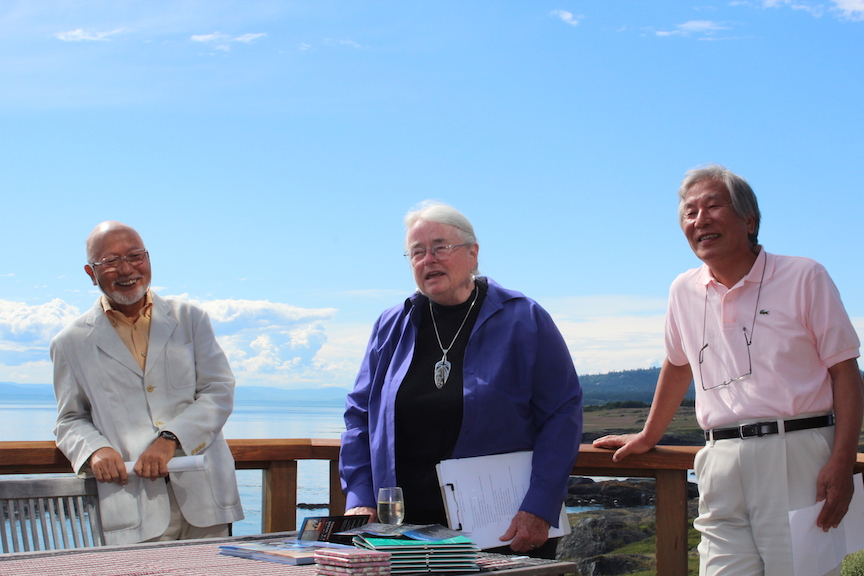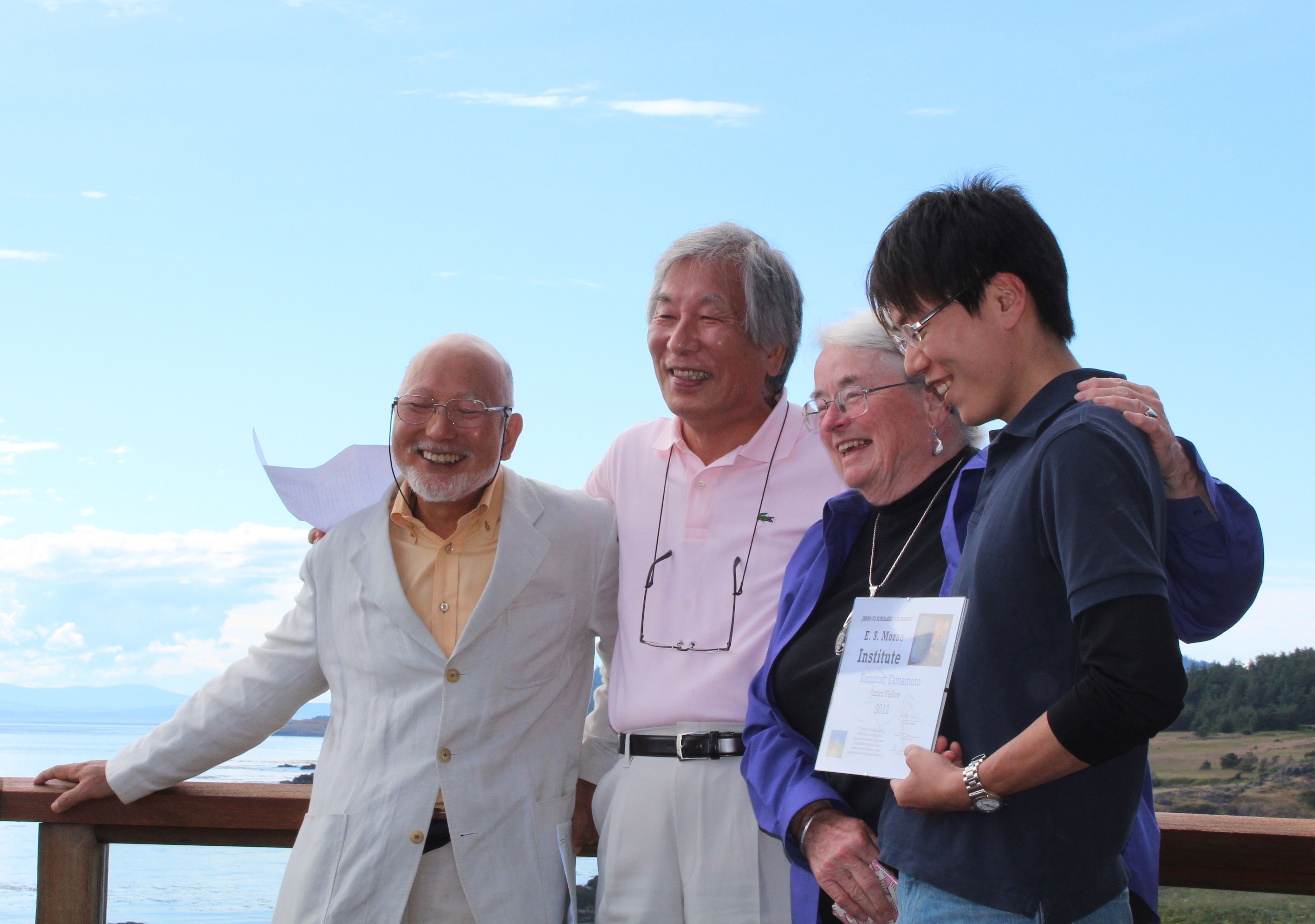- Introduction
- ES Morse
- Morse in New England
- Morse as an illustrator
- Morse in Japan
- Morse's pottery collection
- Charles Otis Whitman
- Shosaburo Watase
- Umeko Tsuda and Sutematsu Yamakawa
- Katsuma Dan
- Emperor Showa (Hirohito)
- Shinya Inoue
- Osamu Shimomura
- Susumu Honjo
- --------
- E.S. Morse Institute
- Institutional Cooperation
- Fukushima
- About
E.S. Morse Institute
Dr. Trish Morse, the first person born in Woods Hole to receive the Ph.D. degree in Marine Biology, in conjunction with two Japanese colleagues, Dr. Motonori (Ghen) Hoshi and Dr. Makoto Omori have founded the E.S. Morse Institute at the Friday Harbor Labs in Washington State. The purpose of the Institute, founded in 2012, is to exchange scholars: Japanese and U.S. undergraduate students, graduate students, post doctoral associates and early faculty members. Scholars and fellows take part in experiences in research, teaching, course work and other interactions in Marine Biology at the Akajima Marine Science Laboratory, the University of Tokyo Misaki Marine Biological Station, the University of Tsukuba Shimoda Marine Research Center, the Nagoya University Sugashima Marine Biological Laboratory, and the University of Washington Friday Harbor Laboratories.

The founders of the E.S.Morse Institute: (l-r) Dr. Makoto Omori, Dr. Trish Morse, and Dr. Motonori (Ghen) Hoshi.
The institute is named after the American who became the first Professor of Zoology at the University of Tokyo. During his four years in Japan, Edward S. Morse introduced evolution and zoology to Japanese students and created the first marine collecting station at Enoshima.
Morse encouraged the exchange of scholars between these two countries in the 1870s, leaving a legacy that the Institute seeks to formalize and support for future collaborations. (Dr. Trish Morse says that although E.S.Morse is not her grandfather, he is indeed a cousin of her great-grandfather!).
The three founders established the E.S. Morse Institute to create a continuous collaboration with the following objectives:
- strengthen international collaboration,
- create a community of scholars
- open this exchange to both senior scholars (faculty) and junior scholars (graduate students and postdocs).

Dr. Omori, Dr. Hoshi, and Dr. Morse announcing one of the first Morse Institute awards to Kazunori Yamamoto junior member of the Morse Institute. The two Japanese founders are themselves long-time visitors and collaborators at the Friday Harbor Lab.
Founders of the E.S. Morse Institute
Motonori Hoshi
Professor Motonori Hoshi (known to the community as “Ghen”) is currently a professor at the Open University of Japan. He received his Doctorate at the University of Tokyo. He has taught at Hokkaido University, Nagoya University and at the Tokyo Institute of Technology where he served at Department of Life Sciences Chair, Dean and Vice President. His research is in the field of invertebrate reproductive Biology, particularly on molecular mechanisms underlying gamete interaction and on gamete glyco- conjugates. Professor Hoshi has over 200 publications and numerous book chapters. His numerous honors include honorary membership in the International Society of Invertebrate Reproduction, Fellow of the American Association for the Advancement of Science (AAAS), Miller Visiting Professorship at the University of California – Berkeley, and honorary member of the Zoological Society of Japan. He has served as Editor for academic journals, and President of the International Society of Invertebrate Reproduction and Development Zoological Society of Japan, Japan-Italy Society of Biology and International Union of Biological Sciences. He serves as a member of the Science Council of Japan and Senior Academic Advisor of the Japan Society for the Promotion of Science.
Makato Omori
Professor Makoto Omori (known to the community as “Mac”) has had a long interaction with the University of Washington, in the Department of Oceanography and visiting the Friday Harbor Laboratories. With a Ph.D. from Hokkaido University, he held positions in the Ocean Research Institute at the university of Tokyo, and the Tokyo University of Fisheries. In his later professional years in Japan, he was the Director of the Akajima Marine Science Laboratory, situated on Aka Island, a part of the Kerama Islands, Okinawa. Dr. Omori is well known for his planktonic studies and served as President of the Plankton Society of Japan. He developed successful methods for restoration and remediation of coral reefs. He has over 200 publications and he is the author of 12 books. Among his interests include a publication on Crustaceans on postage stamps from 1870. At present he continues climbing challenging mountains all over the world!
M. Patricia Morse
Professor M. Patricia Morse (known to the community as “Trish”) is a marine biologist and science educator at the University of Washington. For thirty-four years, she was Professor of Biology at Northeastern University. The last four of those years were spent as a Program Director at the National Science Foundation (NSF) in the Division of Elementary, Secondary and Informal Education. After this, four years were spent teaching in the Biology Department at the University of Washington in Seattle. Trish holds a BS degree from Bates College, an MS and Ph.D. from the University of New Hampshire, and an honorary D.Sc. from Plymouth State College. She is the third recipient of the American Institute for Biological Sciences (AIBS) Education Award. She has published over 50 papers and 34 abstracts in molluscan biology and more recently published in science education. Morse is a past president of Sigma Xi, the Scientific Research Society and the American Society of Zoologist (now the Society for Integrative and Comparative Biology - SICB), and is a Fellow of the American Association for the Advancement of Science (AAAS). SICB recently named an award for science education in her name. For 36 years she served on the Board of Trustees at Bates College in Maine. She recently served as chair of a National Academies of Sciences NRC Committee on “Attracting Science and Mathematics Ph.Ds. to K-12 Education. Now Professor emerita, she holds an appointment of Visiting Scholar on the Faculty of the Biology Department at the University of Washington.